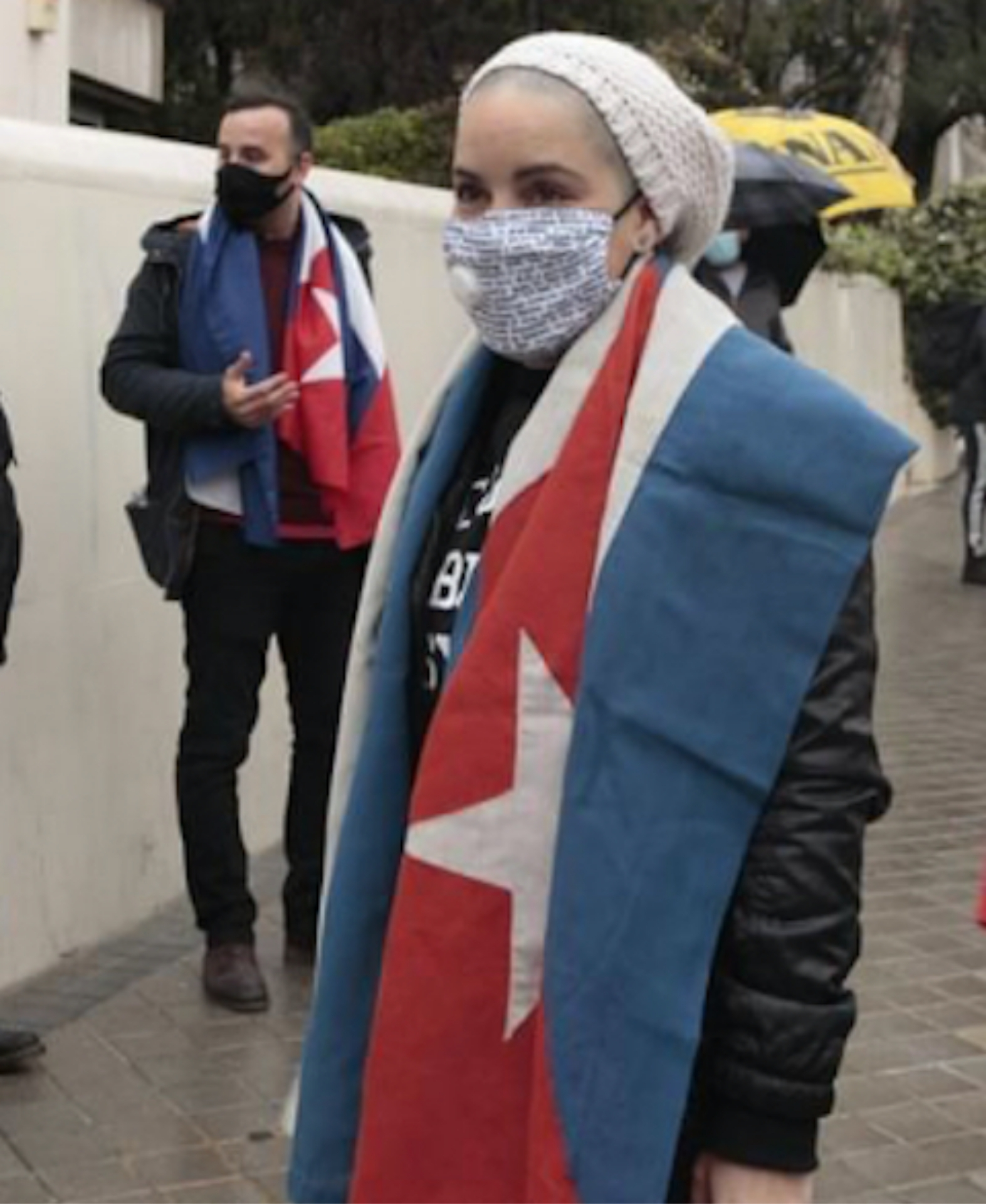By Maria Rodriguez Puzo
I do not know Masiel personally. I have never smelled her or touched her hands; however, something about her reminds me that I am alive. I don’t know Masiel; I just follow her profile on Facebook. I follow the girl who writes her name backward and appears to everyone as Lesiam Rubio.
Masiel or Lesiam is Cuban and bisexual, resides outside of Cuba, and faces the dictatorship of my country through social networks and alternative media.
When I read or see Masiel, I have a role model in front of me. I imagine her as a girl—barely 10 years old—reciting poetry on school mornings, where children are forced to shout the slogans “Pioneers for communism, we will be like Che” and “Socialism or death.” And when she gets home, she finds a true democracy, a home with smart, crazy, and well-traveled parents and kind and dignified grandparents.
I can imagine her growing up in Jaruco, a town with horrible winters. She wears stockings that someone gave her and her older brother’s old coat. She becomes a teenager amid the difficulties of the 1990s, marked by an economic crisis and a famine that still persists. Her grandmother is there for her; her grandmother is her sunshine. Her grandmother teaches her to give, even the things she does not have.
Since she was little, Masiel has known that something is wrong in Cuba; things are not how they should be. She does not feel comfortable in the stands. She does not accept her school’s political positions. She is a brilliant student: she quotes the Apostle José Martí; she reads Virgilio Piñera; she devours every book that falls into her hands; but she does not join the Revolution, she refuses to be part of the farce.
The young woman learns to stand up for herself under duress. She enters the José Martí Art Instructors Brigade and stands out as the best in her class. She also stands out in that she owns her sexual orientation without shame.
Her rebellion distinguishes her. She is irreverent in the face of dogma and leftist policies. Nobody has to tell her how to think, live, breathe. They call her crazy and she laughs, though in her own words she admits, “I have my hobbies and I have never been very sane. I meditate and cry. I drink coffee even though I have to cut back because of my heart, I dance like the best and, despite being constantly pissed off about everything, I love, and I love so much, I think that’s why I run on all cylinders.”
She begins to meet her own people: the marginalized, the dissidents, the silenced intellectuals, those who protest against the regime, the perverts, the lost. She begins to manifest herself and discovers that her internal force is unstoppable.
The economy hits her; her family needs her sacrifice; and she leaves the country. She abandons her grandmother. She leaves Cuba with a suitcase loaded with nostalgia, a bronze bust of José Martí, and his complete works.
Masiel has been outside of Cuba for three years. She lives in Spain, but Cuba is still there. Her large eyes light up when she talks about her land; her throat knots, and her chest trembles—the country beats in that chest. Her comrades in struggle, “the new pines,”1 are tortured and violated in San Isidro.2 There is a struggle in Cuba, and she is not on the streets of Havana defending her flag.
From Europe, Masiel fights. On November 25, 2020, Masiel and activist Yanelys Núñez3 shaved their heads in front of the Spanish Congress of Deputies. They surrendered their hair as an act of protest, calling the world’s attention to the human rights violations that are increasing in Cuba today. It was Masiel who was in charge of publishing the statement, “I Am From a Country,” a text that describes the abuses and outrages that the Cuban people and the opponents of the Revolution are experiencing.
For Masiel, things have not been easy. I think that’s so for almost everyone who finds themselves odd in a world of pairs. And this girl gives life her best smile and, though afraid, she faces her fears. Born in 1985, this actress, playwright, teacher, editor, proofreader, female, Latinx, and bisexual, is there to tell us that we can give more.
Maria Rodriguez Puzo is a Cuban journalist with a Master’s in Cultural Community Development, who now resides in the United States.
Note: Keja Valens provided translation consultation for this essay.
______________________________________________________________
1A reference to the title of a speech Jose Martí gave about students who had sacrificed themselves for freedom: Speech “Con todos y para el bien de todos.”
2Links about Movimiento San Isidro in Havana, Cuba:
https://www.amnesty.org/es/latest/news/2020/12/cuba-san-isidro-movement-allies-under-frightening-levels-surveillance/ and https://cnnespanol.cnn.com/video/que-es-movimiento-san-isidro-cuba-pkg-ana-maria-mejia-cnnee/
3 https://diariodecuba.com/derechos-humanos/1606331914_26745.html

